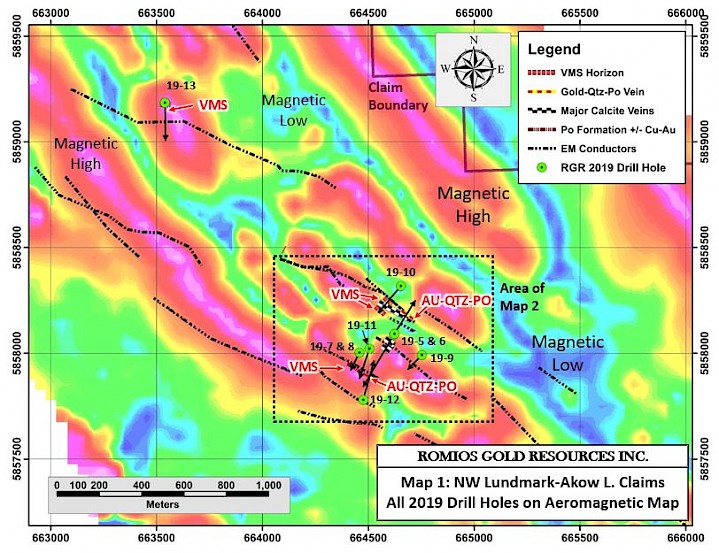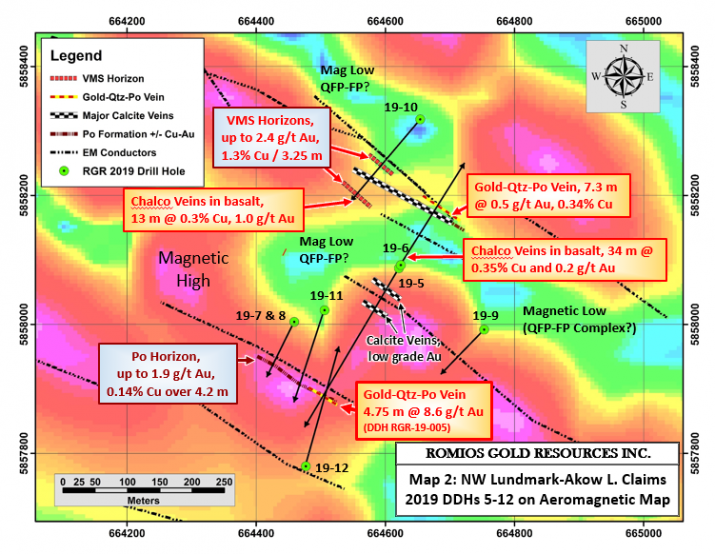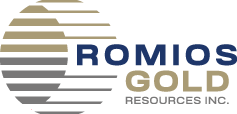TORONTO, ONTARIO, December 5, 2019, Romios Gold Resources Inc. (“Romios” or the “Company”) (TSX.V-RG) (OTC-PK: RMIOF) (Frankfurt: D4R) is pleased to report that the fall drill program at the company’s Lundmark-Akow Lake claims in NW Ontario has uncovered four different styles of Copper-Gold mineralization in close proximity to each other. These different zone types locally occur close enough to each other to create broader, semi-continuous composite zones, e.g. 22.6 m @ 1.2 g/t Au, 0.46% Cu in hole RGR-19-010 (Table 1). The intriguing possibility that as many as three of these mineralization types are genetically linked is now being investigated.
Seven drill holes, totalling 1,345 metres (Table 2), were drilled in the northwest portion of the property in September 2019 to follow-up the June discovery of a high-grade gold vein (8.64 g/t Au over 4.75 m in hole RGR-19-5; see Romios’ news release July 10, 2019). A number of EM conductors along strike from the >11 km long VMS (Volcanogenic Massive Sulphide) type alteration pathway and associated copper-gold-silver horizon discovered in past drill programs were also targeted (1.9 m @ 2.35 % Cu, 1.4 g/t Au and 68.2 g/t Ag; see Romios news release dated September 19, 2017).
The four types of mineralization discovered are summarised below:
- Copper-Zinc-Lead-Gold-Silver rich VMS exhalative horizons. For the first time, VMS zones significantly enriched in all 3 base metals as well as gold and silver have been discovered on the property. Three separate VMS zones were intersected by the September drilling in holes RGR-19-010 and -013. The thickest zone returned assays grading 2.4 g/t Au and 1.26% Cu over 3.25 m while another zone returned assays of 0.43% Cu and 1.5 g/t Au over 2.6 m as well as 1.8% zinc, 0.7% lead and 34 g/t silver over 0.6 m (Table 1; Maps 1 and 2). These discoveries extend the known length of the VMS alteration and mineralization system to over 11 km. The Zn-Pb bearing horizons are the first discovered in this part of the greenstone belt and provide an important validation of the VMS model being pursued by Romios as well as a potential additional vector towards the center of the VMS system. Hole RGR-19-010 was the first and still the only hole to test the main portion of a >700 m long conductor which remains open along strike and at depth. Three EM conductors 600-1,500 m long remain untested immediately along strike (Map 2). The possibility that this mineralization is genetically related to the nearby pyrrhotite zones and vein mineralization is now being investigated.
- Vein-type copper-gold mineralization in basalt. Wide zones of moderate grade Cu-Au vein-type mineralization were discovered in basalts adjacent to quartz-feldspar porphyry intrusions for the first time in the June drilling program and then again in September. A broad intercept of 33.7 m @ 0.35% Cu and 0.2 g/t Au was returned in June (RGR-19-006) and 13.25 m @ 0.32% Cu and 1.05 g/t Au in September (RGR-19-010) (see Table 1). The individual veinlets can be very high grade, e.g. a 20 cm sample in hole RGR-19-008 with a single 2 cm wide chalcopyrite vein assayed 46.4 g/t Au and 1.68% Cu. Vein samples are often highly anomalous in tungsten (>200 mm W) indicating that the porphyry intrusions are the likely heat and fluid source for the Cu-Au rich veins. The correlation of the porphyries with large magnetic lows suggests that these intrusions could be very widespread.
- Gold-rich quartz-pyrrhotite veins spatially associated with “Red Lake type” “epithermal style” open-space filling calcite veins. Follow-up drilling of the gold-quartz-pyrrhotite vein discovered in June was hampered by flooding in the area but drilling nearby did intersect additional “Red Lake type” calcite veins in holes RGR-19-010 and -013, significantly expanding the areal extent of this vein system by >1.4 km. A winter program of ground geophysics is being designed to trace the extent and orientation of the gold-bearing vein(s) prior to the next drill program.
Table 1: Mineralized Intercepts, September Drilling and Sampling Program
| DRILL HOLE | FROM | TO | LENGTH* | Au g/t | Cu % | AuEq g/t** | COMMENTS |
|---|---|---|---|---|---|---|---|
| RGR-19-006 | 8.0 | 41.7 | 33.7 | 0.2 | 0.35 | 0.7 | June DDH, sampling finalised in September |
| RGR-19-007 | 52.30 | 53.65 | 1.35 | 0.7 | 0.93 | 2.0 | Basalt with Chalcopyrite (Cp) veinlets |
| RGR-19-007 | 103.0 | 107.2 | 4.2 | 1.94 | 0.14 | 2.1 | Pyrrhotite (Po) zone and overlying siliceous, veined zone. Incl. 2.9% Zn/0.3m RGR-19-008 104.2 104.4 0.2 46.40 1.68 48.7 Pyrrhotite rich metasediment/felsic tuff. |
| RGR-19-008 | 126.5 | 130.3 | 3.8 | 1.10 | 0.32 | 1.5 | Suphide rich felsic tuff |
| RGR-19-009 | - | - | - | - | - | - | No Significant Results |
| RGR-19-010 | 17.1 | 20.2 | 3.10 | 1.35 | 0.50 | 2.0 | Basalt with Chalcopyrite + Pyrrhotite veinlets |
| RGR-19-010 | 53.8 | 64.0 | 10.2 | 0.62 | 0.38 | 1.1 | Basalt with Chalcopyrite + Calcite veinlets |
| RGR-19-010 | 95.75 | 98.3 | 2.55 | 1.90 | 0.85 | 3.1 | Basalt with Chalcopyrite + Calcite + Pyrrhotite |
| RGR-19-010 | 124.00 | 126.60 | 2.60 | 1.50 | 0.43 | 2.1 | VMS Zone in felsic volcanics |
| including | 126.00 | 126.60 | 0.6 | 1.21 | 0.65 | 2.1 | VMS Zone with 1.8% Zn, 0.7% Pb, 34g/t Ag |
| RGR-19-010 | 187.30 | 209.90 | 22.60 | 1.20 | 0.46 | 1.8 | Combination of 3 adjacent zones |
| including | 187.30 | 193.40 | 6.10 | 0.86 | 0.35 | 1.3 | Basalt with Chalcopyrite veinlets |
| including | 193.40 | 196.65 | 3.25 | 2.44 | 1.26 | 4.2 | VMS zone in felsic volcanics |
| including | 194.15 | 195.85 | 1.70 | 4.28 | 2.24 | 7.4 | VMS in felsic volcanics: 0.6% Zn, 44 g/t Ag |
| including | 196.65 | 209.90 | 13.25 | 1.05 | 0.32 | 1.5 | Basalt with Chalcopyrite veinlets |
| RGR-19-011 | 157.55 | 158.50 | 0.95 | 2.83 | - | 2.8 | 3 intervals of 1.3-2.8 g/t Au / 0.6 to 0.9m between 157.6 and 166.2m. Pyrrhotite veins. |
| RGR-19-012 | 151.5 | 153.2 | 1.7 | 1.50 | - | 1.5 | Thin Pyrrhotite veins in basalt |
| RGR-19-013 | 11.90 | 14.00 | 2.10 | 3.18 | 0.44 | 3.8 | VMS style Cp-Pyrite in felsic volcanics |
| including | 13.65 | 14.00 | 0.35 | 8.27 | 0.61 | 9.1 | VMS style Cp-Pyrite in felsic volcanics |
| RGR-19-013 | 108.60 | 108.98 | 0.38 | 0.38 | 0.59 | 1.2 | Pyrrhotite zone |
*True Widths are expected to be 70 to 80% of the Drilled Lengths except hole RGR-19-009 which is ~56%.
** AuEq = Au (g/t) + (1.37104 * Cu%) using metal prices of USD $1300/oz Au and USD $2.60/lb Cu. Metal recoveries of 100% were applied to the gold and copper values.
4. Gold and Copper-enriched pyrrhotite formations within mafic and felsic volcanics. The best intercept of this type of mineralization was 4.2 m grading 1.94 g/t Au and 0.14% Cu in hole RGR-19-007 (Table 1). The intercepts in holes RGR-19-007, 008 and 011 are continuous over a length of 100 m and appear to be the source of a 3-400 m long conductor.
Table 2: Drill Hole Details, September Drilling Program
| DDH # | Easting | Northing | Depth | Azimuth | Dip | TARGET |
|---|---|---|---|---|---|---|
| RGR-19-07 | 664459 | 5858004 | 134 | 208 | -45 | EM conductor 100 west of Au vein in hole #5 |
| RGR-19-08 | 664459 | 5858004 | 180 | 208 | -60 | EM conductor 100 west of Au vein in hole #5 |
| RGR-19-09 | 664753 | 5857992 | 167 | 225 | -45 | EM conductor 100 east of Au vein in hole #5 |
| RGR-19-10 | 664654 | 5858318 | 191 | 220 | -45 | 700 m long northern EM conductor coincident with Quartz-Po-Pyrite-(Au) vein in hole #6 |
| RGR-19-11 | 664506 | 5858022 | 197 | 198 | -45 | EM conductor 50 west of Au vein in hole #5 |
| RGR-19-12 | 664477 | 5857780 | 240 | 16 | -45 | Upward projection of Au vein in hole #5 |
| RGR-19-13 | 663520 | 5859168 | 236 | 180 | -45 | EM conductor 1.5 km NW of hole #5 |

Map 1: Northwestern Lundmark-Akow Lake Claims 2019 drill holes on aeromagnetic map.
4
 Map 2: 2019 drill holes RGR-19-005 to -012 on aeromagnetic map
Map 2: 2019 drill holes RGR-19-005 to -012 on aeromagnetic map
In addition to the diamond drill program in September, detailed soil sampling was conducted at the high-grade Spence gold-copper+/-cobalt showing which returned 14 historic assays between 0.35 and 38.6 oz/t Au in 1997. Sampling was focussed over a linear magnetic low that flanks the showings to the west in an area that returned highly anomalous copper-in-soil values in June 2019 (64 to 1,660 ppm Cu). The new results confirm the presence of a gold anomaly (3 to15 ppb Au vs the background of 1 ppb) approximately 200 m long (N-S) and 50 m wide (E-W) as well as a larger coincident Copper-Arsenic anomaly >375 m long (N-S) and 60-130 m wide (E-W) with values of 38 to 693 ppm Cu and 10 to 179 ppm As vs backgrounds of ~23 ppm Cu and ~7 ppm As. The anomalies partially overlie the known showings and extend westward into a low-lying area bounded on the west by a prominent deformation zone. Further soil sampling, mapping and prospecting is planned in 2020.
Romios VP-Exploration, John Biczok, P.Geo., commented: “the discovery of polymetallic, zinc-lead-copper-gold-silver rich zones in three VMS type horizons is an important new finding that expands the footprint of the >11 km long VMS system at Lundmark-Akow Lake and gives us critical data points to zero in on the centre of this system. The nearby intercepts of broad zones of Cu-Au vein-type mineralization flanking an extensive quartz-feldspar porphyry complex provides an exciting new target in the same vicinity as both the VMS zones and the high-grade gold-quartz-pyrrhotite veins discovered in June. Although flooding prevented closely spaced follow-up drilling of the gold vein, drilling nearby did intersect a number of the very unusual Red Lake style calcite veins believed to be related to the gold mineralizing event and the distribution of these veins has given us new indications on the orientation of this mineralization. We expect that a winter ground geophysics program will allow us to better define the thickest portions, the extent, and the orientation of all four mineralized systems prior to the next phase of drilling.”
The current drill sites are located 30 km north of Newmont Goldcorp’s Musselwhite gold mine with its all-weather road access and connection to the provincial power grid. Romios has a 100% working interest in the 8,022 hectare (18,823 acre) Lundmark-Akow Lake property, part of which is subject to a 3% net smelter return royalty held by a corporation controlled by the president and CEO of the Company. All samples were submitted to the Actlabs laboratory in Thunder Bay, Ontario for analyses and assays. As a matter of procedure, a rigorous quality assurance and quality control program was implemented to ensure reliable assay results. The technical information in this news release has been reviewed and approved by John Biczok, P. Geo., VP-Exploration for Romios and a Qualified Person as defined by National Instrument 43-101. In addition to his extensive experience exploring for a wide variety of ore deposit types across Canada and India, Mr. Biczok spent 12 years conducting exploration and research at the Musselwhite mine.
About Romios Gold Resources Inc.
Romios Gold Resources Inc., a progressive Canadian mineral exploration company established in 1995, is engaged in precious and base metal exploration primarily focused on gold, silver and copper. It has extensive claim holdings covering porphyry copper-gold prospects in the “Golden Triangle” of British Columbia as well as a 100% interest in the Lundmark-Akow Lake property in Ontario, the La Corne molybdenum property in Quebec and the Scossa gold property in Nevada. The company also retains a 2% NSR on the Hislop gold property in Ontario.
This News Release contains forward-looking statements which are typically preceded by, followed by or including the words “believes”, “expects”, “anticipates”, “estimates”, “intends”, “plans” or similar expressions. Forward-looking statements are not guarantees of future performance as they involve risks, uncertainties and assumptions. We do not intend and do not assume any obligation to update these forward- looking statements and shareholders are cautioned not to put undue reliance on such statements. Neither TSX Venture Exchange nor its Regulation Services Provider (as that term is defined in the policies of the TSX Venture Exchange) accepts responsibility for the adequacy or accuracy of this release.
For further information, please contact:
Tom Drivas, President and Director, (tel) 416-221-4124, (fax) 416-218-9772 or (email) romios@romios.com.
John Biczok, P. Geo., Vice-President, Exploration, (tel) 613-410-7877 or (email) john.biczok@gmail.com
Frank van de Water, Chief Financial Officer and Director, (tel) 416-221-4124 or (email) fvandewater@rogers.com.
